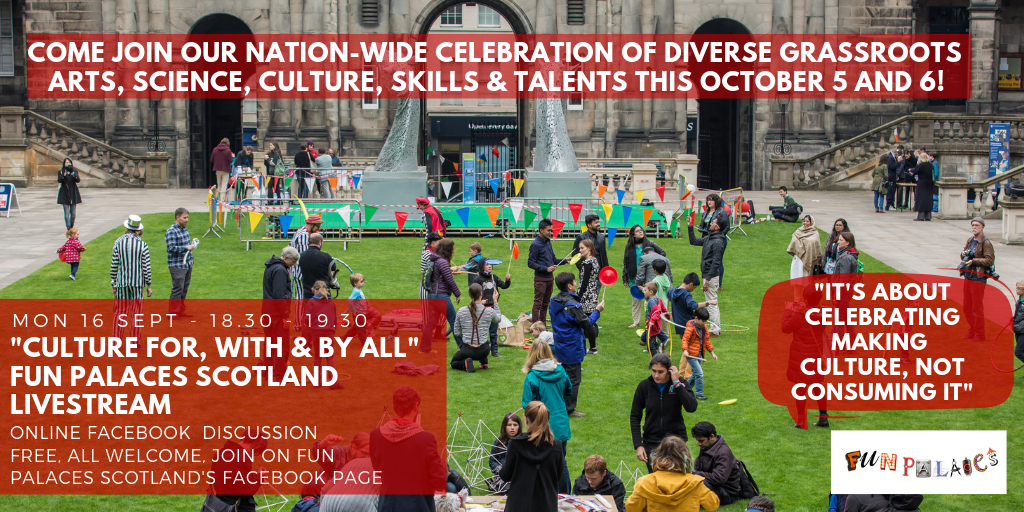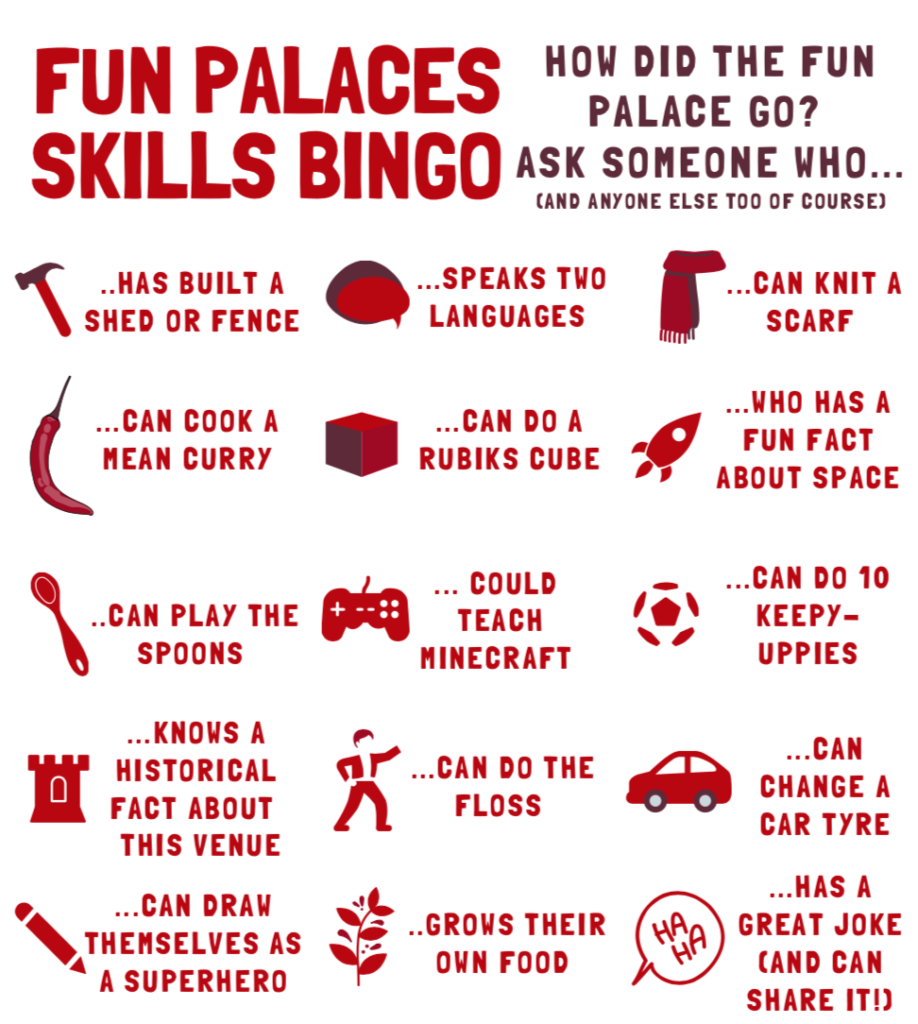Palasau Hwyl Yr Alban
Cysylltwch â’n Llysgenhadon yn Yr Alban
Mae’n ymwneud â dathlu creu diwylliant yn hytrach na’i ddefnyddio fe”
Cyfranogwr yng Ngweithdy Diwylliant i Bawb Inverness 2017
Mae Palasau Hwyl yn dathlu diwylliant (y celfyddydau, gwyddoniaeth, treftadaeth, creu, campau, doniau cuddiedig a sgiliau cyfrinachol) wedi’i arwain yn lleol gan gymunedau, am ddim, yn hygyrch ac i bawb – pobl ifanc, oedolion, pawb!
Cymerwch ran ym mhenwythnos Palasau Hwyl y flwyddyn nesaf, 1/2/3 Hydref 2021! Gall unrhyw un fwrw ati, gyda digwyddiadau mawr a bach i ddathlu’r arbenigedd sydd eisoes yn eich cymuned, gan rannu sgiliau ac angerdd, pryd o fwyd, rhedeg sesiwn flasu fach, ffordd newydd o gydweithio neu hyd yn oed roi cynnig ar rywbeth hollol newydd a dysgu gyda’n gilydd!
2019 Fun Palaces
From Benbecula to Culloden, this weekend communities across Scotland are celebrating the arts, sciences, heritage, culture and skills already in their communities as part of the Fun Palaces campaign! All the events are free, locally-led, hands-on and encourage both young people and adults to try something new and share their own skills!
Fun Palaces this year include skills being shared from library-goers in Western Isles, across Fife, Greenock and Orkney libraries trying everything from tai-chi, virtual reality, cartoon drawing, hand-spinning, story-telling 3D printing, crafting, sculpting and up-cycling! You’ll have a chance to try being a radio DJ at Living Memory Association in Leith, have a go at vegetable growing and Musical Production at Auchinleck, and writing letters of kindness at Macroberts Arts, Stirling. In partnership with National Trust for Scotland, four sites will be opened for free including chainsaw carving and ceilidh dancing at Brodie Castle and embroidery and gardening creepy crawlies at Hugh Miller’s Birthplace Cottage.
We’re proudly interdisciplinary so you can try slime-making as well as skating skills at Eden Court, Inverness, and instruments and marine conservation in Loanhead with the Midlothian Science Festival, digital skills at Dynamic Earth and maths magic at Leith Labs!
You can find out the nearest one near you on our map here and it’s never too late to get involved. Nothing nearby you? Organise a small skills-share wherever you are – kitchens, venues, parks, gardens…anywhere. Fun Palaces are all about the process, so don’t need to be big or shiny. Put yourself and your event on the map here!
If you’d like other ideas, read below, join the Fun Palace Scotland facebook group and say hello, or get in touch with the Scotland Ambassador Lewis Hou on lewis@scienceceilidh.com or @funpalacescot #funpalaces

Fun Palaces Skills Bingo!
For this year, we’ve developed a skills bingo poster to help celebrate the diverse skills of participants, help make capturing participant feedback more engaging and encourage people to get involved!

You can download it here.
Previous Scottish Fun Palaces
Some of brilliant Fun Palaces events from recent years include:
- Sharing gaelic, science of microbrewing, yoga, banana pianos, knitting, tattoo art and cartoon drawing across Fife libraries and galleries! (2016, 2017, 2018)
- Sharing some new moves with a deaf-accessible dance class and apple-pressing at Macroberts Arts (2018)
- Releasing inner cave people exploring prehistoric art in Campbeltown Museum. (2017)
- Warm welcoming to New Scots seeking asylum organised by New Scots who have found refuge in Edinburgh (2017)
- Getting creative with art workshops at WHALE arts, Westerhailes (2017, 2015, 2014)
- Get involved in everything from 3D printing & guitar playing in Orkney Library (2018)
- A pop-up shopping centre dance hall & a “Little Shop of Memory” in Leith celebrating memories of entertainment along with free science and art activities linked with research in the shopping centre with LeithLabs (2018, 2017, 2016, 2015)
- Immerse yourself in virtual reality and your brain at Bishopbriggs library! (2018)
- A chance to become a spy and make Halloween themed art in Auchinleck Library, East Ayrshire (2017, 2018)
- University of Edinburgh opening up its courtyards to choirs, maths-inspired sculpture making, clowning and celebrating the Kelpies in the Yard (2015)
- Directing animation pieces at Tramways Art Space, Glasgow, as part of the Big Draw (2017)
- Exploring the skies, biology tattoos, red squirrels or canine science whilst walkingyourdog in the Midlothian Science Festival (2017, 2018)
- Discovering the science of birds, robotics, coding and music at the Biggar Science Festival, East Lanarkshire (2017)
- Exploring tie-die and arts with Blueprint100 in Dumfries (2018)
- Laughing yourself silly with theatre, clowning and science with Learn Differently Theatre, Lochgelly,Fife (2017)
- A Curiosity Forest with activities exploring squirrels, storytelling and research as part of the Scotland-wide Explorathon (2015, 2016, photos here)
- A Mad Hatters Tea Party as part of Wigtown Book Festival (2015)
- Reminisce around the unique brass bands heritage in West Lothian (2018)
- A community “Science Ceilidh” with science-themed dances and performances (2015)
Fun Palaces Scotland 2017 Summary
Overall across the world, in 2017 there were over 362 Fun Palaces, with 13,750 Makers and 126,000 Participants. You can see the full evaluation here. Read the Scotland-specific report here, or download it here.
Scotland Ambassador
Working to support grassroots cultural participation in Scotland year-round, Fun Palaces Ambassador Lewis Hou was appointed in November 2016 as part of a UK wide three-year cross-sector action research project on cultural democracy undertaking a residency with Voluntary Arts Scotland. With a background specifically in equitable science-art engagement, he is particularly interested in bridging everyday creativity and cultural participation in communities with universities, institutions, arts organisations and art or science festivals (including the “public engagement”, “outreach” and “diversity” agendas) in a way that can continue to genuinely hand-over to communities and challenge assumptions. This includes projects such as Leith Labs residency, evaluating microfunding for communities, having conversations about best practice and challenges with grassroots groups as well as hosting talks and workshops to share learnings between sectors and challenge policy and practice.
From 2019 to 2021, with funding from the National Lotteries Community Fund, this post will be extended for another two years hosted by the Scottish Libraries and Information Council and will be supporting and developing resources for librarians across Scotland to take further leadership in making links with communities to explore grassroots creativity, arts, science, digital skills and health and wellbeing. There is also a new Ambassador hosted by Eden Court Theatre in Inverness supporting grassroots cultural participation across the Highlands.
You can hear him discuss his role here at a Pecha Kucha in Dunfermline here. If you would like support to run a grassroots event in Scotland, host a workshop or hear more about his work, please do get in touch directly by email (lewis@scienceceilidh.com) or twitter.
Get involved
If you’re interested in making your own Fun Palace or finding out more, check out the resources, toolkits and map on the rest of the website, feel free to join the Fun Palaces Scotland specific facebook group or connect on twitter, and get in touch with Lewis for a chat.
*Why are Fun Palaces not the same as a festival?
*Whilst Fun Palaces can share many elements of festivals/open days, or public engagement/outreach events, the key differences lies in striving for more cultural democracy, including:
- The Participation: Encouraging as much active participation and making, rather than having an “audience”
- The Ownership: Not relying on external expertise or resources but unearthing that present locally/in the room
- The Power: The decision making is shared as equally as possible, not being curated but co-curated where possible – even encouraging people to think beyond their professional practice & share their other interests.
That is not to say any of these concepts – e.g. being an audience or external experts – are a negative thing, but rather saying there may not be enough emphasis on the importance of active participation or celebration of expertise that is local (e.g. a mechanic sharing some of his understanding of the engineering behind cars, or passion for knitting or rugby)
